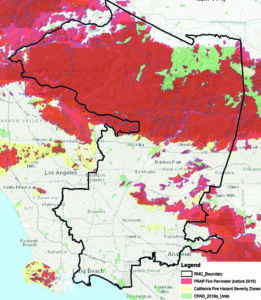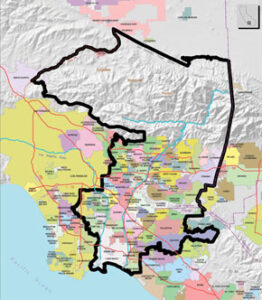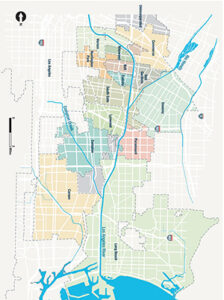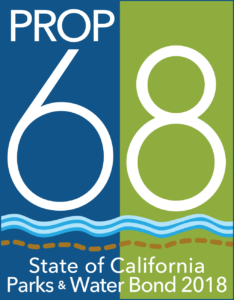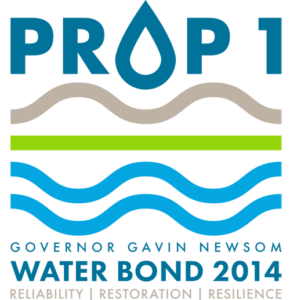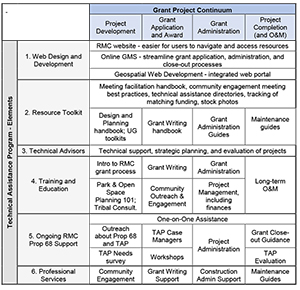RMC Grants

RMC has issued tens of millions of dollars in grants to eligible applicants including non-profits organizations, public agencies, and tribes for projects that preserve open space and habitat, increase public access to it, and help create healthy and climate resilient communities.
Since 2003, the RMC awarded over 295 grants and interagency agreements, which invested at least $91 million of State funds toward creating open space, habitat restoration, expanding greenspace in disadvantaged communities, and protecting the watersheds of the Lower Los Angeles and San Gabriel Rivers.
***NEW: Consolidated Grant Program Application and Guidelines***
To streamline the application process and better match grant applications to funding sources, the Rivers and Mountains Conservancy now requires that all applicants submit a Concept Proposal Grant Application Form before completing a full grant application. Please do not submit a full grant application until your Concept Proposal Application Form has been reviewed by RMC staff.
The RMC has also released updated Consolidated Grant Program Guidelines which can be found here.
Please direct any questions to info@rmc.ca.gov and the project manager if one has been assigned to your project.
Overview of RMC Funding Opportunities
- Non-Bond Priorities Grant Programs:
- Wildfire Prevention Grant Program: $27,000,000 for projects toward preventative measures to increase fire-resilience and prevention, improve forest health, restore burned areas, and stimulate workforce development.
- Climate Resilience Grant Program: $11,100,000 for projects that build community resilience and capacity where resources are most needed. Investments will support multi-benefit and nature-based solutions, which includes funding to support climate change impacts on fish and wildlife, habitat restoration, and activities that accelerate climate smart management of California’s natural and working lands and help meet the State’s 2030 GHG reduction goals.
- Lower Los Angeles-Urban Streams and Rivers Program: $10,000,000 for projects focus on the Water and Environment Plan Element of the Lower LA River Revitalization Plan. Its overarching goal is to conserve and restore natural river and watershed functions while managing flood risk, enhancing the long-term ecosystem services provided to surrounding communities, and mitigating climate changes and environmental impacts of urbanization on the LLAR, floodplains, and associated habitats.
- Proposition 68 River Parkways and Urban Streams for Lower Los Angeles River (LLAR): $37,500,000 for projects that protect or enhance the Lower Los Angeles River watershed and its tributaries pursuant to Section79508 of the Water Code and Division 22.8 and Division 23.
- Proposition 1 River Parkways and Urban Streams for LLAR: $50,000,000for projects to protect and enhance the Lower Los Angeles River watershed and its tributaries pursuant as defined in subdivision (e) of Section 7048, and its tributaries pursuant to Division 22.8 of, and Division 23 of the Public Resources Code and Section 79508.
- Proposition 1 and 68 (Regionwide and LLAR) Small Grants Program: As a subset of RMC’s Proposition 1 & 68 allocations, grants are between $50,000 and $300,000. Projects are evaluated under Evaluation Criteria that receive an average score of 70 percent or better (as opposed to 80 percent or better for regular grant program) will be considered competitive. Priorities include jump-start projects and small design-build projects, project planning, technical assistance such as application assistance to disadvantaged communities, and securing matching funds.
- Proposition 1 and 68 (Regionwide and LLAR) Very Small Grants Program: As a subset of RMC’s Prop 1 & 68 allocations, grants are less than $50,000, and has a more simplified application process compared to all other RMC programs. Projects evaluated under Evaluation Criteria that receive an average score of 75 percent or better will be considered competitive. Priorities include technical assistance such as application assistance to disadvantaged communities, project planning, gap/emergency and high-need project implementation, and securing matching funds.
- Proposition 68 Technical Assistance Program (TAP): Pursuant to Section 8008(b)(1) of Proposition68, up to 10% of the funds available may be allocated for technical assistance to disadvantaged communities. TAP supports local communities with application assistance with the goal of facilitating access to the Conservancy’s funding programs. TAP is available as small and very small Proposition 68 grants.
RMC Funding Opportunities
1. NON-BOND PRIORITIES GRANT PROGRAMS
— RMC’s Non-Bond Priorities Grant Program – FULL Grant Guidelines —
Supporting information/documents:
- What to Submit & Evaluation Criteria
- Non-Bond Priorities Grant Application Form
- General Email: info@rmc.ca.gov
1.1 RMC’s Wildfire Prevention Grant Program
Wildfire History in Southern California (before 2019) – Historical fire perimeters show that many sections of the San Gabriel Mountains range and Puente Hills have burned repeatedly.
On April 13, 2021, Governor Newsom signed into law the Wildfire Prevention and Resiliency Early Action Budget for Wildfire Prevention (SB 85), amending the Budget Act of 2020. This bill allots $536 million for the State of California to put toward preventative measures to increase fire-resilience and prevention, improve forest health, restore burned areas, and stimulate workforce development. The Budget Act of 2020 (Sec. 14 Item 3825-102-0001) appropriated to RMC $12 million for wildfire prevention and resiliency projects within its jurisdiction.
The RMC was appropriated another $15 million through the General Fund in the Wildfire and Forest Resilience package of the Budget Act of 2021 (Sec. 68 Item 3825-102-0001). In addition to wildfire prevention and resiliency projects, the funding is focused on supporting the goals of California’s Wildfire and Forest Resilience Action Plan: A Comprehensive Strategy.
- Wildfire Prevention Program’s Workshop
- Webinar Presentation and Video
Priorities for RMC Wildfire Prevention Grant Program:
- Protect and expand native forests/wildlands;
- Support communities in increasing their resilience to wildfire and improving fire safety;
- Promote sustainable land use;
- Promote investment in wildlands management and workforce development;
- Protect cultural resources vulnerable to wildfire.
Funding for projects will fall under three main categories:
- San Gabriel Mountains and Foothills Fire Prevention Planning and Management: Projects under this category will serve mainly the San Gabriel Mountains and Foothills. Work may include invasive species management and fuel break maintenance in the Angeles National Forest, fuel modification of open spaces in foothill communities, or protection of tribal cultural resources from fire impacts.
- Urban Wildlands and Hills Fire Prevention Planning and Management: Projects under this category will serve mainly the San Jose, San Rafael, Montebello, Puente, Chino, and Coyote Hills, which are urban wildlife corridors surrounded by urban development. Work may include fire prevention planning, fuel load reduction, invasive species management, and maintenance of defensible space.
- Forest Health: Fire Recovery, Response, Restoration, Education and Stewardship: Projects under this category will cover all regions in the Mountains, Hills, and Foothills. Work will improve forest health through a variety of actions with co-fire prevention benefits including native habitat revegetation, infrastructure improvements, and public stewardship building.
1.2 Climate Resilience Grant Program
The RMC was appropriated $11.1 million through General Fund in the Climate Resilience package of the Budget Act of 2021 (Sec. 69 Item 3825-103-0001) over three years to support investments that address the climate risks within RMC’s jurisdictions
- These funds will build community resilience and capacity where resources are most needed. Investments will support multi-benefit and nature-based solutions, which includes funding to support climate change impacts on fish and wildlife, habitat restoration, and activities that accelerate climate smart management of California’s natural and working lands and help meet the State’s 2030 GHG reduction goals.
- Projects must be completed no later than March 31, 2024. RMC must receive final reimbursement requests (invoices) by April 30, 2024.
- Climate Resilience Grant Program’s Workshop Webinar Presentation and Video
1.3 Lower Los Angeles-Urban Streams and Rivers Program
- The RMC was appropriated $10 million through General Fund in the Water and Drought Resilience Package of the Budget Act of 2021 (Sec. 67 Item 3825-101-0001) over three years to support immediate drought response and long-term water resilience. This includes funding to support drought response; drinking water, wastewater, and water supply reliability; water recycling and groundwater cleanup; flood management; restoration of natural areas and ecosystems; groundwater sustainability; water conveyance; and water and habitat improvement for environmental flows.
- A project should have clearly defined goals and outcomes that can be achieved from half a year to two years. Preference will be given to projects that can be implemented quickly, have completed environmental permitting, or program funding is necessary to complete development or implementation (in accordance with program priorities) for any of the 155 opportunity projects and/or seven signature projects listed in the Lower LA River Revitalization Plan or consistent with the LA River Master Plan.
- Lower LA River Program’s Workshop Webinar Presentation and Video
2. PROPOSITION 68 – Parks and Water Bond Act of 2018 – Lower Los Angeles River (LLAR)
Priorities for RMC LLAR Prop 68:
- Develop urban recreation projects and habitat protection or restoration projects,
- Provide workforce development opportunities,
- Expand access to diverse populations,
- Secured matching funds
RMC’s LLAR Grants are specific to the Lower LA River corridor, considered within 1.5 miles of the main stem or tributary of the Lower LA River. 80% is available for Implementation, 10% for planning, and 10% for technical assistance (20% must serve Disadvantaged Communities). Projects should be consistent with the Lower LA River Revitalization Plan, see Plan website here.
More information on Prop 68 and other programs available on Resource’s Bond Accountability page. Email any comments or questions to info@rmc.ca.gov.
Supporting information/documents:
3. PROPOSITION 1 – Water Bond of 2014 – Lower Los Angeles River (LLAR)
Priorities for RMC LLAR Prop 1:
1. Ecosystems and watershed protection and restoration projects,
2. Protect and enhance the Lower LA River,
3. Expand access to diverse populations,
4. Secured matching funds
RMC’s LLAR Grants are specific to the Lower LA River corridor, considered within 1.5 miles of the main stem or tributary of the Lower LA River. 90% is available for Implementation and 10% for planning. Projects should be consistent with the Lower LA River Revitalization Plan, see Plan website here.
Please email any comments or questions to info@rmc.ca.gov
4. RMC PROPOSITION 1 & 68 Subset Grant Program– Small Grants Program
Regionwide & Lower Los Angeles River
RMC’s Small Grants Program are grants between $50,000 and $300,000. Project’s evaluated under Evaluation Criteria that receive an average score of 70 percent or better (as opposed to 80 percent or better for regular grant program) will be considered competitive. Applications will be evaluated quarterly or biannually.
Priorities for RMC Small Grants Program:
- Jump-start projects and small design-build projects
- Project Planning
- Technical Assistance, such as application assistance to disadvantaged communities (Prop 68 only)
- Secured matching funds
- Grant Guidelines
- Evaluation Criteria
- California Conservation Corps – Prop 1 Consultation Form (required), Prop 68 Consultation Form (recommended)
5. RMC PROPOSITION 1 & 68 Subset Grant Program– Very Small Grants Program
Regionwide & Lower Los Angeles River
RMC’s Very Small Grants Program are grants less than $50,000, and has a more simplified application process compared to all other RMC programs. Project’s evaluated under Evaluation Criteria that receive an average score of 75 percent or better will be considered competitive. Applications will be evaluated quarterly or biannually.
Priorities for RMC Very Small Grants Program:
1. Technical Assistance, such as application assistance to disadvantaged communities (Prop 68 only)
2. Project Planning
3. Gap, emergency, and high-need project implementation
4. Secured matching funds
6. RMC PROPOSITION 68 – Technical Assistance Program (TAP)
Pursuant to Section 8008(b)(1) of Proposition 68, up to 10% of the funds available may be allocated for technical assistance to disadvantaged communities. RMC’s Technical Assistance Program (TAP) supports local communities with application assistance with the goal of facilitating access to the Conservancy’s funding programs. Technical Assistance can be applied to through RMC’s Small and Very Small Grants Programs or requested by through RMC staff. Email any comments or questions to info@rmc.ca.gov.
— RMC Prop 68 Technical Assistance Program (TAP) —
Technical Assistance along the Grant Project Continuum
7. RMC PROPOSITION 4- Safe Drinking Water, Wildfire Prevention, Drought Preparedness, and Clean Air Bond
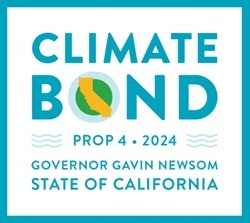
In November 2024, California voters overwhelmingly approved Proposition 4 (SB-867, Allen), a $10 billion Climate Bond designed to safeguard our communities, natural resources and our future in the face of climate change. From wildfire prevention and safe drinking water to protecting biodiversity and increasing access to nature, these funds will support projects that make a real, lasting difference in the lives of people and communities across California. At least 40 percent of all bond funding is legally required to benefit disadvantaged, severely disadvantaged and vulnerable communities.
The full text of SB-867 Safe Drinking Water, Wildfire Prevention, Drought Preparedness, and Clean Air Bond Act of 2024 (Proposition 4) may be found at https://leginfo.legislature.ca.gov/faces/billTextClient.xhtml?bill_id=202320240SB867
The RMC has approximately $112 million available for local assistance grants over the life of its Proposition 4 Grant Program. Specific allocation programs are as follows:
- Safe Drinking Water, Drought, Flood, and Water Resilience [Section 91032(a)]: $40,000,000, of which $36,900,000 may be awarded for projects that improve the climate resiliency or the protection of the Los Angeles River Watershed or are consistent with the Lower Los Angeles River Revitalization Plan
- Wildfire and Forest Resilience [Section 91520(l)]: $33,500,000, of which $30,904,000may be awarded for projects that promote watershed improvement, wildfire resilience, chaparral and forest restoration, and workforce development that addresses needs related to this subdivision and is designed to create career pathways for individuals from disadvantaged communities, severely disadvantaged communities, or vulnerable populations
- Biodiversity and Nature-Based Climate Solutions [93020(a)(6): $48,000,000, of which$44,280,000 may be awarded for projects that reduce the risks of climate change impacts upon communities, fish and wildlife, and natural resources, and increase public access
Resources:
- Disadvantaged Communities (DAC) Mapping Tool, CA Department of Water Resources
- EJScreen: Environmental Justice Screening and Mapping Tool, US EPA
- Community FactFinder, 2020 Edition, CA State Parks
- CalEnviroScreen 4.0, Oct. 20, 2021 Edition, CalEPA
- RMC logo
Payment Request
In order to receive payment, RMC grantees must comply with the Grant Agreement (contract) with the RMC, and submit required documents. See Payments Request page for more details.
Quarterly Reports
In order for the RMC to monitor compliance with the terms of each grant agreement, certain reports must be submitted quarterly. See Quarterly Reports page for more details.
Email: info@rmc.ca.gov


